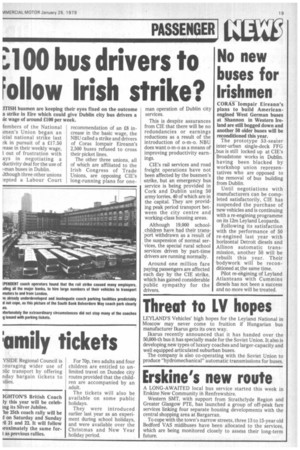00 bus drivers to Follow Irish strike?
Page 21

If you've noticed an error in this article please click here to report it so we can fix it.
ITISH busmen are keeping their eyes fixed on the outcome a strike in Eire which could give Dublin city bus drivers a ;lc wage of around E100 per week.
lembers of the National ;men's Union began an icial national strike last ?.k in pursuit of a £17.50 rease in their weekly wage, 1 out of frustration with ays in negotiating a ductivity deal for the use of -man buses in Dublin.
Llthough three other unions :epted a Labour Court recommendation of an £8 increase in the basic wage, the NBU called a strike and drivers of Coras Iompair Eireann's 2,500 buses refused to cross their picket lines.
The other three unions, all of which are affiliated to the Irish Congress of Trade Unions, are opposing CIE's long-running plans for one man operation of Dublin city services.
This is despite assurances from CIE that there will be no redundancies or earnings reductions as a result of the introduction of o-m-o. NBU does want o-m-o as a means of improving productivity earnings.
CIE's rail services and road freight operations have not been affected by the busmen's 'strike, but an emergency bus service is being provided in Cork and Dublin using 50 army lorries, 40 of which are in the capital. They are providing peak period transport between the city centre and working-class housing areas.
Although 19,000 schoolchildren have had their transport withdrawn as a result of the suspension of normal services, the special rural school services driven by part-time drivers are running normally.
Around one million fare paying passengers are affected each day by the CIE strike, which has gained considerable public sympathy for the drivers.












































































































